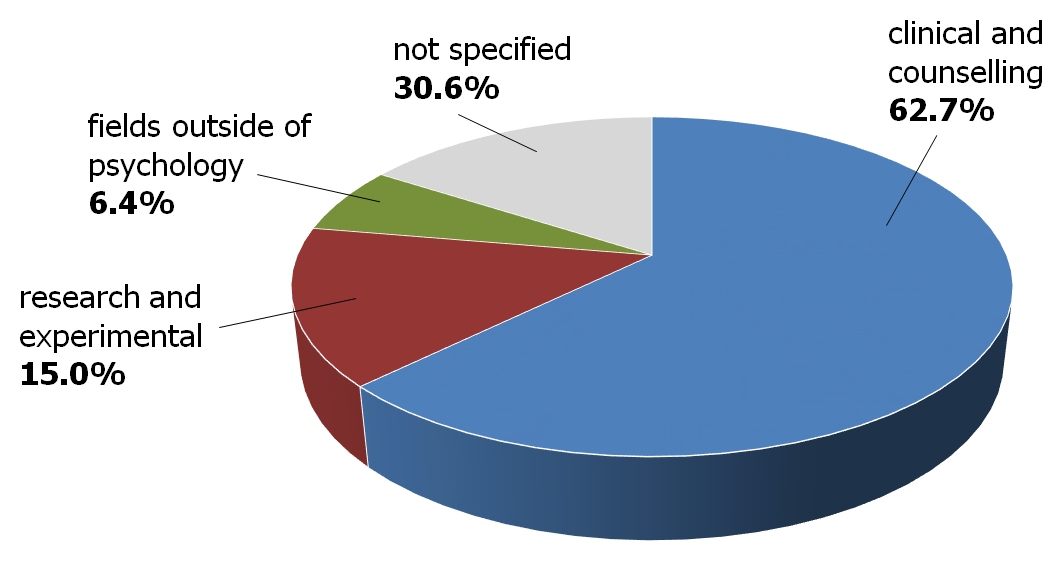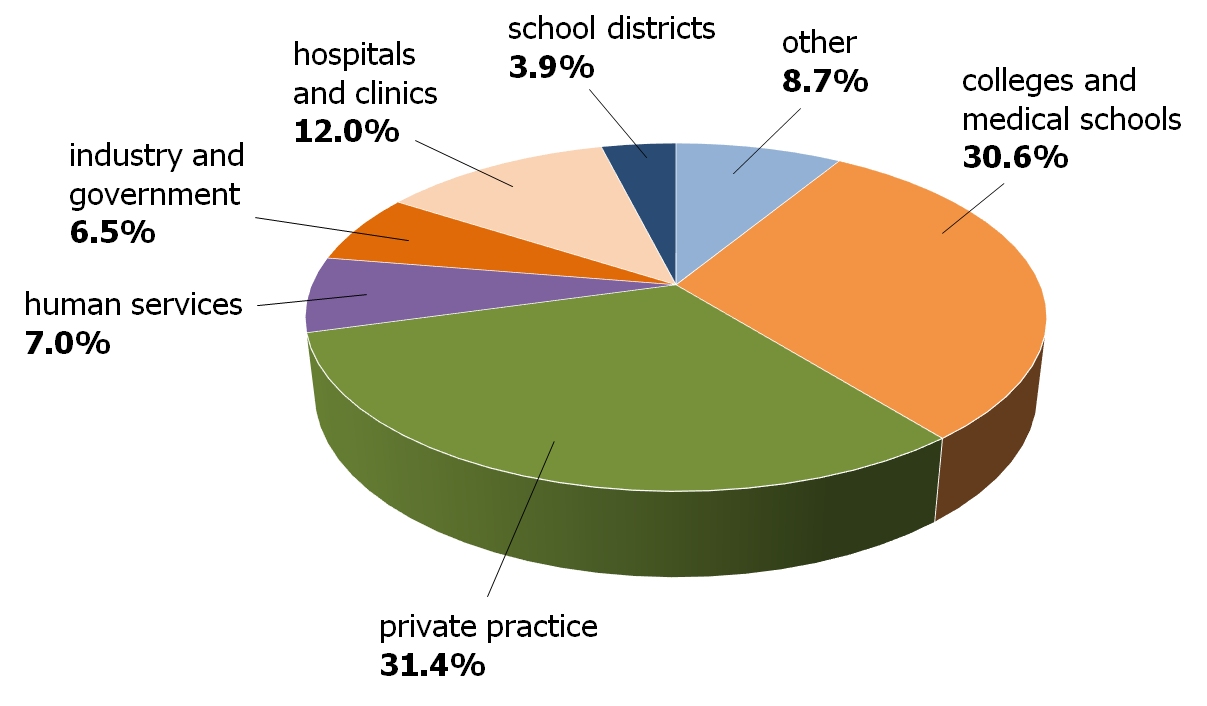1. What is psychology? Where did it come from?
2. What are the major historical points of view in psychology?
3. Who developed these perspectives, and when?
4. Describe the two different approaches in psychology today.
5. How is professional psychology different from psychiatry?
6. How do you become a psychologist?
7. What are some integrative themes in psychology today?
8. What is the SQ4R study method?
We all use folk psychology: the collection of concepts we use in everyday life to explain our behaviours and mental processes.
“common-sense psychology guides our behaviour” --Fritz Heider (1958, p. 5)
Problem: common sense explanations are not necessarily correct.
Solution: think like a psychological _________.
- this statement dates back to at least 1929
- who said this--Albert ________?
- how did they get this number?
- William James (1907) wrote: “We are making use of only a small part of our possible mental and physical resources” (p.322-323)--but didn’t mention the _____
- Karl Lashley (1935) showed that removing some of a rat’s ________ ______ did not affect certain types of learning--but was that tissue useless?
Scientific analysis:
- evidence from _________:
• brain consumes much of the body’s energy resources
• brain is active, even during _____
• unlikely that a 90% useless brain would have evolved
- evidence from ___________:
• without activation in childhood, neural pathways atrophy and brain cells degenerate
• unused brain areas would later be _______
e.g., restored vision in congenitally blind adults is poor
- evidence from ________ studies:
• some parts of the brain are specialized for certain functions
• damage to a region may cause loss or impairment of function
• if 90% were ______ ![]() paralysis/blindness/vegetative state...
paralysis/blindness/vegetative state...
• no part of the brain is ___________
- evidence from modern brain _______:
• different behaviours activate different parts of the brain
• many activities use several brain regions simultaneously
• if 100% was fully active ![]() ________
________
• there are no ______ regions of the brain
Conclusion: statement is “the 10% ____”
__________: from Greek psyche (soul or mind; personified as Psykhe, the lover of Eros) + logos (word, discourse, or reason) (Oxford Dictionary of Psychology, 2015)
- term coined around mid-16th century (by Philipp Melanchthon?)
- meaning “study of the ____” emerged in 18th century (Chr. von Wolff, 1732)
- university departments/professorships in psychology appeared in late 19th century
Late 19th century: the scientific study of conscious experience
_____________:
- What are the basic “________” of conscious processes?
(i.e., sensations, emotions, attention)
- How do these elements become connected?
- What are the laws of connection?
- Wilhelm Wundt (b.1832-d.1920) founded first psychology lab at University of Leipzig in 1879
- James Mark Baldwin (b.1861-d.1934) established first psychological lab in British Empire at U of Toronto in 1889
- Edward Titchener (b.1867-d.1927) relied on _____________: analysis of one’s own conscious experience
_____________:
- What is the _______ of consciousness?
- How are particular mental processes ________?
- How do people change and adapt to their environments?
- William James (b.1842-d.1910) worked at Harvard University; wrote influential The Principles of Psychology (1890)
- Mary Whiton Calkins (b.1863-d.1930) became first woman president of the APA (American Psychological Association) in 1905
_____________ Approach:
- How do dynamic psychological forces affect human emotion and behaviour?
- How can psychological disorders be _______?
- _______ _____ (b.1856-d.1939), neurologist; developed psychoanalytic theory and psychotherapy:
• emphasized the influence of unconscious mental forces
• believed psychological problems have a psychological origin
• clients are free to talk about anything (free association) until they arrive at insight into their problems
- C.G. Jung (b.1875-d.1961) extended psychodynamics; proposed all human beings share a “__________ ___________” that stores the symbols and archetypes shared by all people
Early 20th century: the science of observable behaviour
____________:
- What __________ behaviours can be studied?
- How are they are learned?
- How are they modified by the environment?
- J.B. Watson (b.1878-d.1958) shifted study of mind to study of behaviour
- B.F. Skinner (b.1904-d.1990): we are controlled by our environment, not by ____ ____
_______ Psychology:
- How are cognitive processes _________ (holistic approach)?
- doctrine: whole is different than the sum of the parts
- founded by Max Wertheimer (1880-1943)
__________ Psychology:
- How can we discover and nurture an individual’s potential for ______?
- What makes a person ______?
- Carl Rogers (b.1902-d.1987) developed nondirective client-centred therapy
- Abraham Maslow (b.1908-d.1970) focused on potential for self-actualization
_________ Psychology:
- How does the mind organize and process ___________?
- What is the relationship between cognition and behaviours?
- George Miller (b.1920-d.2012) founded Center for Cognitive Studies at Harvard U in 1960
- Ulric Neisser (b.1928-d.2012) wrote Cognitive Psychology in 1967
__________ Approach:
- What is the relationship between brain structures and psychological functions?
- How does _________ influence behaviour?
- Donald Hebb (b.1904-d.1985) developed _____________: insightful theory of neurological functioning via neural networks
- Leda Cosmides (b.1957) helped pioneer ____________ psychology: views the mind as a set of adaptive mechanisms
Now: psychology (or psychological science) is the science of behaviour and mental processes
- goals: to describe, explain, predict, and control (or change) behaviour and mental processes
- types of research:
• _____ research: intended to add to our knowledge
• _______ research: designed to solve a practical problem
____________ psychology: scientific investigation of how normal people think and behave; includes:
• behavioural ________:
What role does genetics play in behaviours?
How can your experiences change you--and your descendants?
• ________ ____________:
Which brain structures underlie specific behaviours?
What are the effects of the drug ecstacy on the brain?
• sensation & __________:
How do we extract information from energy in the world?
Why do some people hear colours or taste shapes?
• _________ analysis:
What is the relationship between stimuli and behaviour?
What does not eating a marshmallow have to do with having a better, more fulfilling life?
• _________ psychology:
How does the mind process information?
What is the best way for you to learn and remember information for an exam?
• human factors & __________:
How does psychology relate to design and everyday things?
What’s worse, drinking and driving, or using a cell phone and driving?
• ______ psychology:
How do we influence and interact with one another?
How much of your feelings and attitudes do you express in your body language?
• ________ psychology:
What things lead to strength of character, optimism, and health?
How can you lead a happier life?
____________ psychology: application of scientific knowledge by practitioners to particular populations (also called clinical psychology)
- Lightner Witmer (b.1867-d.1956) established the first psychological clinic in 1896; introduced the term “________ __________” in 1907
• ________ psychology:
How can we learn about, diagnose, and treat people who have major problems coping with everyday life, or a psychological disorder?
• ___________ psychology:
How can we help people overcome less severe difficulties in one aspect of their lives (e.g., family or marriage)?
e.g., in family or married life
• ___________/school psychology:
How can we help children who have difficulties in school?
What’s the best way to do standardized testing?
What is appropriate curriculum for a particular grade/age?
• __________/organizational psychology:
What candidates are the best fit for a job?
How should a company’s organizational structure be designed?
__________:
• medical specialty (are medical doctors first)
• diagnose/treat psychological disorders
• can _________ medication
• not a branch of __________
How to become a chartered psychologist (in Alberta):
- complete Bachelor’s degree (4 years)
- take GRE (Graduate Records Exam) General Test and apply to graduate school
» GRE General Test does not include any psychology content
- earn Master’s or Ph.D. degree in psychology or related field, or Psy.D. (2+ years)
- practice for 1,600 hours under supervision of chartered psychologist
- pass written and oral exams
- register with provincial regulating body, College of Alberta Psychologists (CAP):
• sets standards (e.g., Code of Conduct, Code of Ethics)
• monitors/regulates practice
• licenses psychologists (a.k.a. registered or _________)
- note: “__________” and “therapist” are not official, legal titles
How to become a ____________:
- take relevant courses and complete Bachelor’s degree (2+ years)
- take MCAT (Medical College Admission Test) and apply to medical school
» MCAT includes a section on psychological, social, and biological foundations of behaviour
- earn M.D. (3 or 4 years)
- become a resident in __________ (5 years)
- pass certification exams
- become registered member of College of Physicians and Surgeons of Alberta (CPSA):
• administers standards of practice and conduct
• resolves complaints
• licenses physicians
Specialty areas in psychology (APA, 2010):

Employment settings (APA, 2010):

____________ Societies:
- membership is voluntary
- publish scientific journals
- hold annual meetings
- lobby governments
- focus may be ________ or experimental
• American Psychological Association: - est. 1892 - 122,500 members
|
|
• Association for Psychological Science: - est. 1988 - 26,000 members
|
|
 |
• Canadian Psychological Association: - est. 1939 - 7,000 members
|
• Canadian Society for Brain, Behaviour and Cognitive Science: - est. 1992 - 400 members |
• increasing ___________ of disparate viewpoints within psychology
• increasing _________________ integration (with anthropology, neuroscience, philosophy, etc.)
e.g., What is the influence of _______ on thinking and behaviour? (limits what is acceptable; context for understanding)
• more emphasis on (and understanding of) the brain
e.g., How does consciousness relate to brain activity?
1. Psychology is _________
It is based on empirical evidence (observation and experimentation), and adapts as new data is collected.
2. Psychology explains _______ principles
Although there may be individual differences, our goal is to understand the general principles that govern behaviour and mental processes.
3. ________ levels of analysis are required for explanations
What are the multiple causes of a given behaviour?
We need to understand the psychological, biological, social, and environmental factors that influence behaviour and mental processes.
4. Our experience of the world is highly __________
How warm does room temperature feel?
5. Nature and nurture work ________
How do they interact?
6. Reciprocal determinism: psychology affects society, but is also affected by society
When was _____________ no longer classified as a psychological disorder?
7. Applying psychological findings to our lives can result in ________ change
Benefits include understanding yourself and others better; helping those with psychological disorders; being happier.
Robinson (1978) and Walter, Siebert, & Smith (1999):
S_____: skim through chapter
Q_______: what’s the point of each section?
R___: in the proper environment
R_____: make active notes in your own words
R_____: associate new information to what you already know
R_____: concentrate on problem areas
To learn, information must be ________ processed, which requires effort.
Schultz, D. P., & Schultz, S. E. (2015). A history of modern psychology (11th ed.). Boston, MA: Cengage Learning.
Kimble, G. A., Wertheimer, M., & White, C. L. (Eds.) (1991-2006). Portraits of pioneers in psychology (Vols. I-VI). Washington, DC: APA.
Nist-Olejnik, S., & Holschuh, J. P. (2016). College Rules! How to Study, Survive, and Succeed in College (4th ed.). Berkeley, CA: Ten Speed Press.
Dunn, D. S., & Halonen, J. S. (2020). The psychology major’s companion: Everything you need to know to get you where you want to go (2nd ed.). New York: Worth Publishers.